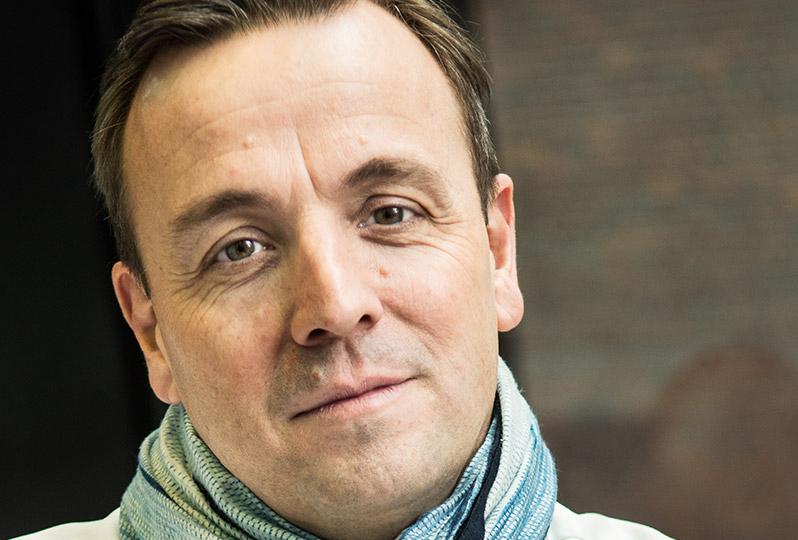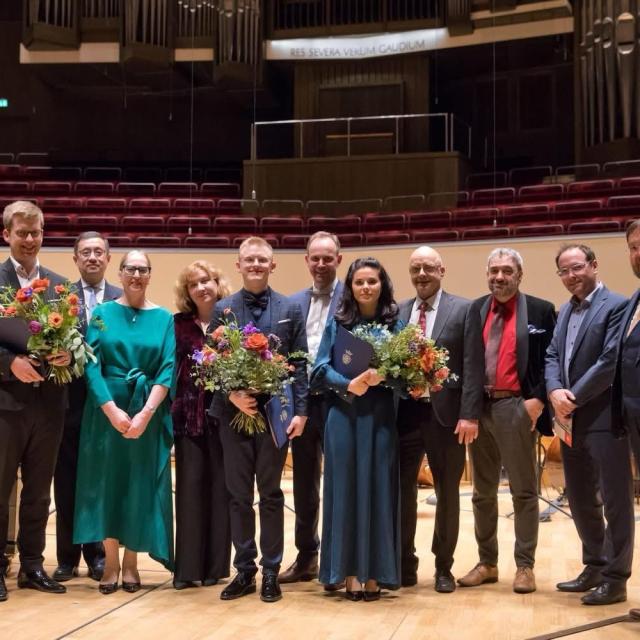Introducing: Andrew Watts

The British Countertenor will begin his tenure as General and Artistic Director of the International Vocal Competition of ´s-Hertogenbosch in September
Few countertenors have pushed the boundaries of repertoire and sound more than Andrew Watts. A dramatic voice unlike any other and extraordinary stagecraft and presence make him a unique performer not only of parts traditionally associated with the voice type, but also a pioneer of 20th and 21st-century repertoire. A regular guest at Covent Garden, La Scala, La Fenice, Staatsoper Berlin, Bayerische Staatsoper and many others, Andrew Watts is a much sought-after soloist around the word.
WFIMC: Where is home for you now?
Andrew Watts: For now, it is London, but I will partly move to the Netherlands in January. It does not look good politically if the General Director lives out of town. Besides, I like to live in a place that is not a hotel, where I spend so much of my time anyway.
You are the first non-Dutch person in this position…
This is interesting. So far, there has been only one comment like “Well, I hope he speaks Dutch”. Actually, at the moment, I don´t speak Dutch, but I am learning. I did part of my job interview in Dutch, just to prove that as a singer, I can speak four or five languages, I can read Dutch and I´ll make it. Maybe it will be charming to have someone speaking Dutch with a British accent… we´ll see.
That´s very impressive.
To speak Dutch? There is this famous moment in “A fish called Wanda” when John Cleese starts speaking Russian to seduce Jamie Lee Curtis. It feels a little bit like that. But my involvement with IVC didn´t start overnight. I first visited in 2018. It was Annett Andriesen´s last year, we had been singing together at La Scala and at Dutch National Opera, and she had asked me “Would you like to be on the jury of this international competition?”
So I thought, yeah, okay, why not. I turned up, and all of the sudden I saw myself sitting next to Kiri Te Kanawa, thinking: wow, this is serious.
So we had a really nice time, I was asked to sing the opening recital, and we gave masterclasses. I met singers who I´ve always been obsessed with- you know, I have a really unhealthy collection of CDs, several thousand, because I just have always loved voices. I met singers here like the Croatian mezzo Dunia Vejzovic, who was just extraordinary. And of course I had met Ivan van Kalmthout there as well.
Being a soloist is a rather different thing than having to direct a competition…
Yes, but I´ve always artistically directed. I´ve aways had my own companies. I´ve always curated programs, and I liked that idea. So this job came up and I thought, well, why not? So I put in an application and did the first interview on zoom thinking “No, I´m not sure about this”. And I did the second interview, which was having to do a 20-minute presentation. And I thought “The board is terrified of me!” I was coming in saying “We have to do this, we need to do that”, and it´s very difficult to express if you want to run something in a certain way.
Well, apparently they were not THAT terrified…
I just set out the vision of the five points that I wanted IVC to think about. I remember my last comment saying to them: “I think you just need to be really brave about this”. And, believe it or not, they decided to be brave. It´s quite extraordinary for them, because I think it will be a big change. To take on a non-Dutch person. Someone who is still maintaining an operatic career (and that itself will pose many logistical questions).
But when they rang and said I got the job, I did burst into tears because I just thought that nothing like this had ever happened to me before.
So now I have a great team and a financial structure in place. I will have to do a lot of fundraising and financial planning, but there´s a starting point. This is something I´ve never experienced before, and it´s really lovely. The rest, as they say, is history…
One question that has come up quite a bit recently: you´re not Dutch; IVC is held in a relatively small country, but while it´s international it´s also supposed to support Dutch artists and foster the musical scene in the Netherlands. For a few years after IVC started in 1954, there were plenty of Dutch participants and Dutch winners, but recently, numbers have gone down a bit. Some prizes were given to Dutch performers, but the last winner of the Grand Prix´s-Hertogenbosch (the First Prize) was Angelina Ruzzafante in 1992 (sadly, she died earlier this year after a long illness). What importance do you give to this issue?
Well, in fact, one of the sentences I used in my presentation was saying: “I don't understand why the IVC is not championing its own Dutch singers!” It's almost like the British don't champion their own singers within their own country. Like, „the grass is greener somewhere else“. I intend to redress that balance because I think it's really important that the IVC is engaged with all of these Dutch singers. There will be a network of Dutch singing teachers. There will be a network of Dutch singers. The IVC will not only be a competition, it will be like an arts hub, where people can get advice and connect with others. We will invest in Dutch singers, and there should be courses only for Dutch singers, to find out who´s out there.
There are some very good Dutch singers, but for me, somehow the Dutch establishment doesn't believe in them enough.
At the same time I have to say: is it important that a Dutch person wins? No, not really, because the best singer should win, no matter where they are from. But I feel that we should be investing in Dutch singers, and Dutch educated singers as well.
Actually, I have another small job as artist in residence of The Hague Conservatory, which starts in September. If I see this as a 15-year plan, we need to be going into finding these young singers who are 14, 15, 16 years old right now, in order to build a pool of talent in the local area, expand that, and hope that at some point there will be Dutch winners. There are some great Dutch singers, definitely. I'm interested to see how we can also attract Dutch singers who are really good but who've never been in a competition before.
How does IVC serve its purpose to foster artists and their careers? It´s interesting that you don´t have First, Second, Third Prize but rather awards with a name tag attached. So its not so much a ranking but rather a distinction you give.
The competition itself is just a small part of what the IVC can do in terms of career support. It´s not about giving people money, it´s about enabling people to have a better career and set up collaborations between directors, between opera houses, between my address book and anyone who happens to be part of it.
You mention your address book. Can you elaborate a little on that? This is what we are really interested in- how can a competition serve its purpose better.
Everything- the ranking, the age limits- everything is up for discussion at the moment. I think that there's a necessity for competitions not only to go: „Here's some money, goodbye, have a nice life!“. It can't be that. Competitions shouldn´t be replacing agents or managers, but they should be acting as a kind of a middle man between artists and venues, festivals and orchestras. A middle man who says: „Oh, actually, I know you're doing this project. Can I suggest a singer for it?“
Once you become part of the IVC family, you will simply stay with it for the rest of your career. Because it´s a network that includes the best people in the business.
There´s a lot of goodwill in the world for the championing of young artists. My address book is full of people -soloists, conductors, directors- who will be a part, who will not just help awarding money, but who will bring something more tangible to the competition. Opportunities, network, connections- or, more specifically, masterclasses, lessons, private auditions. I want the people on the panel to absolutely invest in the young artists they are hearing. And not just the winners- it´s about the whole gamut of people from preliminaries to finals.
The 2023 IVC is held in the category of Lied duo, its jury including three pianists, a composer and two singers. What´s your take on Lied competitions- how can they actually support young singers outside of the opera circuit?
The panel is absolutely fine for what we´re trying to do- there are some outstanding artists, and in a Lied competition we absolutely need the pianists. Your other question- do we actually need a Lied competition- is really interesting because we have to wonder whether there really still is a market for someone just standing up and singing with a piano. There may be some movement in that, but I´m not quite sure yet. But I think what needs to be looked at is the way we present concerts. Traditional recital programs are simply not interesting anymore for audiences. We need to find a way in which people in competitions also compete for their programs, for the ideas and messages they want to convey with their performance: whether its thematic, genre, gender, climate, war, or anything that will make for a strong statement. And, just to add this- it´s okay to speak to the audience, not just vocally when you´re singing up there, but also to actually talk and say: “Hi, how´s it going?” Anybody who specializes in singing Lieder knows that they have to look for something new, because the demographic of the audience is always getting older... So where do we bring the young people? It´s not about doing a tap dance or taking your clothes off. If I want people to come and have a good evening, I need to communicate, I need interaction. At the end of the day, we´re entertainers. We need to be entertaining people in its rawest sense, but we elevate that to something that´s rather beautiful.
©WFIMC 2023/FR





